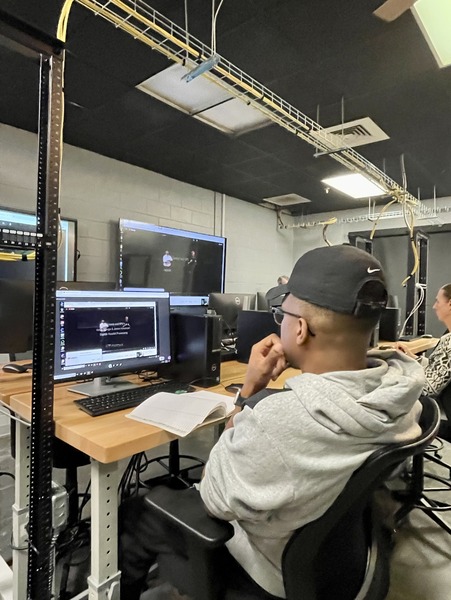USCB Turns Old School into New Cybersecurity Lab
 An inside look at USCB’s new Cybersecurity lab located in Beaufort.
An inside look at USCB’s new Cybersecurity lab located in Beaufort.Filled with computer work stations and racks of electronic gear, the former Bridges Preparatory School in Beaufort now sports an industrial-gray décor with wall-mounted large-screen monitors for use by cybersecurity students learning how to prevent cyberattacks.
It’s the University of South Carolina Beaufort’s newest classroom, the result of the 2021 grant proposal that led to $1.3 million in funding. The grant came from the U.S. Department of Defense’s office of Local Defense Community and funded the renovation and equipment for the new cyber lab.
A ribbon cutting was held March 20 for the new space at 1100 Boundary St.
In remarks at the event, USCB Chancellor Al M. Panu credited Brian Canada, Department of Computer Science & Mathematics chair, with what he considered an apt description of the facility.
“As you walk in there, there is something very cool about this industrial look. It reminds you of shows such as ‘24’ and ‘The Blacklist,’ and what it has in there,” Panu said. “I have to agree it was definitely wonderful to be able to find that analogy. It is absolutely fascinating.”
Panu told the audience that cybersecurity will be a top priority for every company, and the cybersecurity industry is expected to grow by 44% in the next five years, requiring companies to hire cybersecurity professionals.
“As you may be aware, USCB’s cybersecurity program presently exists in the form of a degree concentration within our baccalaureate program in Information Science and Technology,” he said at the ceremony. “While much of USCB’s cybersecurity curriculum can be supported by so-called ‘virtual lab’ software solutions that can be used by anyone with an internet connection, what makes this particular lab unique is the integration of specialized network security equipment that has been furnished to USCB by Fortinet.”
Fortinet is a global cybersecurity company that provides a wide range of network security solutions for enterprises, service providers and government organizations. Panu said the company’s reputation for quality rivals such highly regarded security solutions providers as Palo Alto Networks and CheckPoint.
“Having this equipment available in the classroom provides our students with much more of a hands-on experience that goes far beyond network security fundamentals and theory,” Panu added. “All of this technology and its use by our students is simultaneously supported by Fortinet’s cybersecurity certification program pathways that map various levels of Network Security Expert (or NSE) expertise to the National Initiative for Cybersecurity Education, or ‘N.I.C.E.’, framework that is expressly designed to enable organizations to develop a modern, skilled cybersecurity workforce.”
The City of Beaufort bought the 24,000 square-foot building, which originally housed the Beaufort Boys & Girls Club, from the school for $2.3 million in December. Inside there are classrooms, meeting spaces and a gym. The city is funding it through $450,000 from the state, $500,000 from the county, and the rest through a bond.
Also speaking at the ribbon-cutting was Beaufort Mayor Stephen Murray. He is vice chair of the South Coast Cyber Center, a 501(c)(3) collaboration of public and private partners to establish a center of innovation, academic excellence, and economic opportunity in cybersecurity.
“It’s a big deal for us to buy a building like this, at this scope, but we knew it was the right thing to do for our partners: the University of South Carolina Beaufort, Technical College of the Lowcountry, the Beaufort Digital Corridor, the Beaufort County Economic Development Corporation, government, and the private sector,” Murray said.
Matthew Heightland, director of Information Technology Services and Support, explained the use of the hardware already installed in the racks, which included a power over ethernet switch connected to a wireless access point, as well as a firewall. Students will be exposed to the actual equipment, although there is a virtual analog hosted by Fortinet.
“This is more to support an advanced network security,” Heightland said. “Whenever you’re working on industry standard certifications, you want to have equipment that you can work with. Now, you don’t necessarily need the physical devices, so that’s why we also have the virtual analog of all of these, but it makes life a lot easier. You don’t want the first time you see the machines (to be) when you’re troubleshooting them.”
The new Cybersecurity Lab page on the university’s website notes that “With a focus on information security, digital forensics, ethical hacking, and system administration, students will gain technical knowledge and skills to develop and maintain cybersecurity solutions,” and describes what the classroom provides.
“We are marking a giant step forward in ensuring the security of our systems,” Panu said, “and continued undisrupted delivery of business and economic services for our region, state, nation and beyond.”
By Gwyneth J. Saunders, a veteran journalist and freelance writer living in Bluffton.
This story originally appeared in The Bluffton Sun on April 3, 2023.